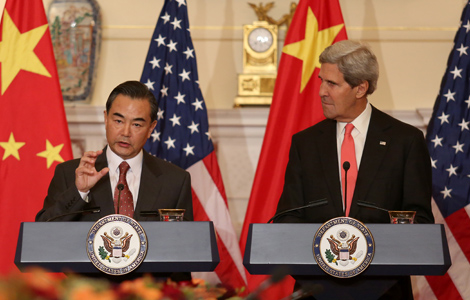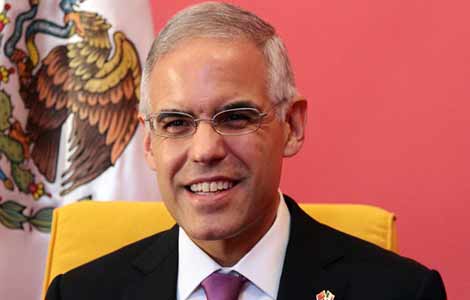Business forum to build bond
Updated: 2013-09-19 08:21
By Zhang Lei (China Daily)
|
||||||||
"We should first recognize the history of relations between us, since most people may think that China and African countries have just entered a new relationship," says Belinga Thierry, 31, chairman of the Junior Africa China Economic Forum.
By tracing the history, Belinga, from the Cameroon capital of Yaounde, says China's presence in Africa today is positive and practical. He compares it to a friend who visits another to compare cultures, resources and ideas on how to improve lives.
"It's not wrong to say that the Chinese presence in Africa is mostly geared towards doing business - that is, using their comparative advantage as a means of exchanging goods and services," Belinga says. "But it's wrong to reduce it to just doing business. There is a deep cultural exchange that exists, and with that, China and Africa have built a strong friendship and relationship that will last for many generations to come.
"To enhance and reinforce that relationship, Chinese and African youth who represent the current and the future thinking have to come together as one body to create and sustain economic growth."
Following this belief, he created the Junior Africa China Economic Forum, in the hope that by training and equipping African youth, they can change the face of Africa positively in the next 10 years.
Many young Chinese and African people are not entrepreneurial and are unaware of the opportunities offered to them in China and in Africa, Belinga says, and the young entrepreneurs whom he and his team have found do not know how to start a business. Yet, there are many Chinese companies in Africa struggling to find people who can help them with their operations, particularly ones trained in China.
The forum was set up in response to this situation, but building a new network of young entrepreneurs requires appropriate training resources and workshops.
"At present, we have more than 100 participants in the forum, and have the full support of 15 African students unions and several African embassies in China, and Chinese companies," Belinga says. "Our primary strategy is to organize regular seminars and one international conference every year. We also plan to create a website to equip and train participants, where they can also share their experiences."
The forum has four main activities: conference-themed presentations with Q&A sessions, workshop sessions, business meetings, and companies' product exhibitions.
Its first forum, which took place in Beijing over two days in June, was on youth, entrepreneurship and economic growth.
"After two days of intensive work, the forum helped people find new business partners, and we can't wait for next year's to see what these partnership agreements have brought," Belinga says.
He is also hoping for more partnerships between Chinese and African universities that will bring together young people to discuss and propose solutions to problems faced by both economies.
"Having exchange programs among African and Chinese Universities will help achieve that purpose," Belinga says. "We appreciate the initiative taken by the Chinese government to grant annual scholarships to African students, but for more effectiveness, we need more."
Belinga says he finds young Chinese entrepreneurs are more relationship-oriented, allowing time to establish trust and friendship with partners. Once that trust is gained, everything goes smoothly, he says. Young African entrepreneurs are more results-oriented, focusing more on the benefits to be gained at the end.
Chinese and African entrepreneurs also differ in their ability to meet deadlines when doing businesses, Belinga says. "Because of the lack of appropriate infrastructure, there is a delay on the part of African entrepreneurs to give vital information required by their partners. During the forum, we found a way to solve this issue by suggesting African participants have a database of vital information, which is to be regularly updated.
"We also emphasized that both Chinese and African young entrepreneurs should be truthful when accepting an order. What is the sense of pretending that you have the ability to supply goods when in fact you can't?"
Belinga summarizes the method of releasing true potential in young entrepreneurs as:
First, young people should be offered internships and other opportunities for voluntary service, where they can work, learn and discover their potential.
Second, financial resources should be allocated to those who have feasible and profitable projects. And, finally, there should be seminars and forums on topics such as entrepreneurship and leadership for both African and Chinese young people.
"Dr Myles Munroe, a well-known international speaker, emphasizes that work is the master key to releasing people's potential," Belinga says. "If we want to see people's potential, let's give them work. If they can't work, let's teach them how to work.
"With the right resources at our disposal, we can achieve our dreams and improve people's lives and livelihoods," he says of his forum. "Four weeks before the first forum, we had less than 3,000 yuan ($490) to realize this program. But we found ourselves at the right place, with the right people, who believed in our dream and who decided to help us achieve it.
"After the forum, we were so happy to see three Chinese people who traveled all the way to Kinshasa with the CEO of Congolese company Alma SPRL.
"Another successful outcome of the forum was the creation of an international company whose goal is to collect and finance feasible and profitable projects in Africa. We look forward to seeing many more projects of these sorts.
"We're sure that the next edition of the Junior Africa China Economic Forum will have a greater impact than the first one. So we welcome any companies, organizations and individuals who want to join us in that exciting adventure of changing our communities."
Most Viewed
Editor's Picks

|

|

|

|

|

|
Today's Top News
Super typhoon Usagi to hit S China
US not to levy punitive duties on Chinese shrimps
Philippines evacuates coast as typhoon nears
BlackBerry warns of big loss, 4,500 job cuts
Syria details part of chemical arsenal
Action pledged for new type of Sino-US ties
Worries linger over GM rice test
Ancient site helps lift thousands out of poverty
US Weekly

|

|













